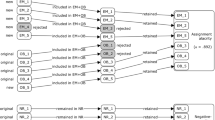Abstract
This study summarizes the test results of 89 applicants to the Society of Jesus, a religious order of Roman Catholic priests and brothers. Applicants were above average in intelligence and educational attainment. Applicants’ highest vocational theme score was Social, with subtest profiles most strongly suggesting interests in the areas of Religious Activity and Teaching. Applicants obtained MMPI profiles generally indicative of healthy psychological adjustment. Test scores did not clearly predict whether applicants remained in any of the training periods for the priesthood or the priesthood itself. This paper identified four psychological characteristics, defined by clusters of MMPI scores, which may be useful in screening applicants to the Jesuit Order.
Similar content being viewed by others
References
Banks, S., Mooney, W. T., Mucowski, R. J., & Williams, R. (1984). Progress in the evaluation and prediction of successful candidates for religious careers. Counseling and Values, 28, 82–91.
Bier, W. D. (1948). A comparative study of the seminary group and four other groups on the MMPI. Studies in Psychology and Psychiatry from the Catholic University of America, 7(3), 1–105.
Bradley, M. (1970). Statistical comparison of the Otis Self-Administering Tests of Mental Ability and PSC Examinations 302A and 5A (GIT series). Studies in Personnel Psychology, 2, 74–80.
Burke, H. R. (1947). Personality traits of successful minor seminarians. Washington, DC: Catholic University of America Press.
Butcher, J. N., Dahlstrom, W. G., Graham, J. R., Tellegen, A., & Kaemmer, B. (1989). Manual for the restandardized Minnesota Multiphasic Personality Inventory: MMPI-2: An administrative and interpretive guide. Minneapolis: University of Minnesota Press.
Callahan, L. J., & Wauck, L. R. A. (1969). Characteristics of a minor seminary population on the Edwards Personal Preference Schedule. National Catholic Guidance Conference Journal, 13, 30–37.
Campbell, D. P. (1971). Handbook for the SVIB. Stanford: Stanford University Press.
Francis, L. J., Louden, S. H., Robbins, M., & Rutledge, C. F. J. (2000). Unmasking the clerical persona: Interpreting the correlation between neuroticism and lie scale scores among Roman Catholic and male and female Anglican clergy. Mental Health, Religion, and Culture, 3, 134–141.
Gasser, C. E., Larson, L. M., & Borgen, F. H. (2007). Concurrent validity of the 2005 Strong Interest Inventory: An examination of gender and major field of study. Journal of Career Assessment, 15, 23–43.
Gilbride, T. E. (1973). Holland’s theory and resignations from the Catholic clergy. Journal of Counseling Psychology, 20, 190–191.
Graham, J. R. (1990). MMPI-2: Assessing personality and psychopathology. New York: Oxford University Press.
Greene, R. L. (2000). The MMPI-2: An interpretive manual (2nd ed.). Boston: Allyn and Bacon.
Hansen, J. C., & Campbell, D. P. (1985). Manual for the Strong Interest Inventory Form T235 of the Strong Vocational Interest Blank (4th ed.). Stanford: Stanford University Press.
Hathaway, S. R., & McKinley, J. C. (1943). The Minnesota Multiphasic Personality Inventory. Minneapolis: University of Minnesota Press.
Kennedy, E. C., Heckler, V. J., Kobler, F. J., & Walker, R. W. (1977). Clinical assessment of a profession: Roman Catholic clergymen. Journal of Clinical Psychology, 33, 120–128.
Knox, S., Virginia, S. G., & Lombardo, J. P. (2002). Depression and anxiety in Roman Catholic secular clergy. Pastoral Psychology, 50, 345–358.
Knox, S., Virginia, S. G., Thull, J., & Lombardo, J. P. (2005). Depression and contributors to vocational satisfaction in Roman Catholic secular clergy. Pastoral Psychology, 54, 139–155.
Knox, S., Virginia, S. G., & Smith, J. (2007). Pilot study of psychopathology among Roman Catholic secular clergy. Pastoral Psychology, 55, 297–306.
Lhota, B. (1948). Vocational interests of Catholic priests. Studies in Psychology and Psychiatry from the Catholic University of America, 7(1), 1–40.
McMinn, M. R., Hathaway, W. L., Woods, S. W., & Snow, K. N. (2008). What American Psychological Association leaders have to say about Psychology of Religion and Spirituality. Psychology of Religion and Spirituality, 1, 3–13.
Nauss, A. (1973). The ministerial personality: Myth or reality? Journal of Religion and Health, 12, 77–96.
Otis, A. S., (1928). Otis self-administering tests of mental ability, manual of directions and key: For intermediate and higher examinations. Yonkers-on-Hudson, NY: World Book.
Palomo, F., & Wauck, L. (1968). Personality adjustment of minor seminarians and of Catholic high school seniors. National Catholic Guidance Conference Journal, 12, 253–256.
Plante, T. G., & Boccaccini, M. T. (1997). Personality expectations and perceptions of Roman Catholic clergy members. Pastoral Psychology, 45, 301–315.
Plante, T. G., & Lackey, K. (2007). Are successful applicants to the Roman Catholic deaconate psychologically healthy? Pastoral Psychology, 55, 789–795.
Plante, T. G., Manuel, G., & Tandez, J. (1996). Personality characteristics of successful applicants to the priesthood. Pastoral Psychology, 45, 29–40.
Wauck, L. R. A., Walker, R. E., & Lueger, R. J. (1975). Resignations from the Catholic clergy: A further look. PIRI Newsletter, 25(2), 16–17.
Wulff, D. M. (1997). Psychology of religion: Classic and contemporary (2nd ed.). New York: Wiley.
Author information
Authors and Affiliations
Corresponding author
Additional information
Anthony M. Kuchan is deceased.
Rights and permissions
About this article
Cite this article
Kuchan, A.M., Wierzbicki, M. & Siderits, M.A. Psychological Characteristics of Applicants to the Jesuit Order. Pastoral Psychol 62, 319–331 (2013). https://doi.org/10.1007/s11089-012-0492-6
Published:
Issue Date:
DOI: https://doi.org/10.1007/s11089-012-0492-6



